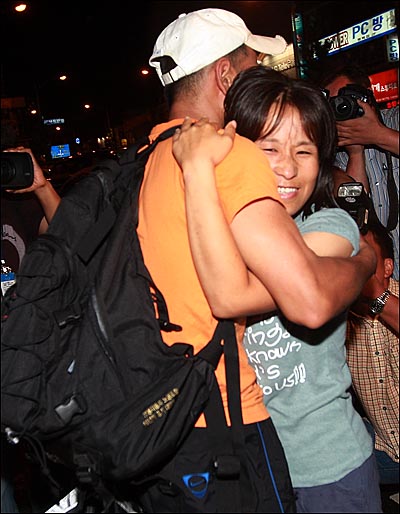Korea

Roddy Quines is a Socialist Alliance of Australia member living in South Korea. This is his first-hand account of the first day of anti-G20 actions on November 7, 2010, in Seoul.
* * *
On the afternoon of November 7 I attended an event called the Seoul International People's Conference. It was organised by trade unions, NGOs and church leaders as an alternative to the G20 conference. The People's Conference is taking place from November 7 to 10. Topics to be discussed include, among others, “Alternatives for the global economy”, “Climate change and civil societies” and “Structural adjustment and labour's strategies for resistance”. November 11 is reserved as a day for direct action with a planned rally and march, and on the morning of November 12 a press conference and strategy meeting are planned.
South Korea: Ssangyong trade unionist's appeal

By Australia Asia Workers Links
People's Republic of China at 60: Maoism and popular power, 1949–1969

Youth demonstrate during the Cultural Revolution.
[Click HERE for more analysis of the Chinese Revolution and its evolution.]
By Pierre Rousset
With the proclamation of the People’s Republic of China on October 1, 1949, the Chinese Communist Party (CCP) found itself at the head of a country three times larger than Western Europe, with a population of some 500 million. The internal situation was favourable to the revolutionary regime. At the end of a long series of civil and foreign wars, the population sought and relied on the new leaders to achieve peace while the ongoing people’s mobilisation opened the way for a deep reform of society.
Industrial action for peace: The Communist Party of Australia and antiwar activity before 1960

[See also South Korea: Graphic photos, video -- Ssangyong sit-in workers' appeal: `Our lives are at stake'.]
By Young-su Won
August 6, 2009 -- After days of harsh and inhumane assaults by riot police and company thugs on striking workers occupying the Ssangyong Motor plant in Pyeongtaek, near Seoul, the Korean Metal Workers Union (KMWU) and management reached an agreement: the union accepted part of the company’s redundancy proposal, saving about half the strikers’ jobs, while the rest will apply for voluntary retirement or unpaid long-term leave, or accept another job with the spin-off company.
(For best results: allow video to load on `pause' before pressing play.)
Urgent appeal by the Korean Metal Workers Union and Korean Confederation of Trade Unions
* * *
See also the statement by the Korean Confederation of Trade Unions, ``Call to Action: Stop Police Suppression against the Striking workers of Ssangyong Motors!''
* * *
Scroll down for earlier coverage.
Urgent Appeal: Ssangyong Motor workers’ lives in danger! Solidarity urgent!
Monday, August 3, 2009
Korean Metal Workers Union (KMWU)
inter@metal.nodong.org
Dear friends,
We urgently request your solidarity regarding Ssangyong Motor Workers’ dispute. It is urgent for the Korean government to step up and play a role toward a peaceful settlement!
Our union members’ lives are in danger.
How Obama pardons capitalism for its misdeeds in Africa
July 20, 2009 -- After the G8 summit in Italy, US President Barack Obama flew off to Africa with a so-called gift: an envelope of US$20 billion to distribute over three years, so that “generous” donors in the rich countries could “help” reduce world hunger. While the promise to eradicate hunger has been made on a regular basis since 1970, the United Nations Food and Agriculture Organisation (FAO) published a report last month indicating that the number of undernourished people has passed the 1 billion point, that is 100 million more than the year before. At the same time, the United Nations World Food Program (WFP) sounded the alarm bell and announced that it had to cut
South Korea’s rollback of democracy

By George Katsiaficas
South Korea: The legacy of the 1980 Kwangju uprising

South Korean troops march on Kwangju, May 1980.
On the weekend of May 15-18, 2009, the city of Kwangju, South Korea, held the Kwangju International Peace Forum to celebrate the struggle for democracy in South Korea and to support similar struggles elsewhere in Asia. Christopher Kerr of South Korea-based solidarity group Venceremos caught up with George Katsiaficas to discuss the legacy of the 1980 Kwangju uprising. Katsiaficas is visiting professor of sociology at Chonnam National University and author/editor of numerous books on international social movements including South Korean Democracy -- Legacy of the Gwangju Uprising and Unknown Uprisings: South Korean Social Movements Since World War 2).
* * *
Chris Kerr: What happened in May 1980 in Kwangju and how was it significant to the democracy movement at that time?
South Korea: Mass movement stops the neoliberal bulldozer
By Christopher Kerr
July 12, 2008, Seoul -- The neo-conservative regime of President Lee Myungbak has been humbled by the spontaneous emergence of a mass movement — sparked by female middle and high school students. This movement has resulted in the largest and longest sustained demonstrations since the fall of the military dictatorship.
The mass protests have been primarily against the imposed resumption of the importation of US beef but have, in the course of their development, tapped into latent anger against the implementation neoliberal policies.
In April, Lee, before meeting US President George Bush at his Texas ranch, agreed to lift all existing bans on US beef imposed in 2003 after a case of mad cow disease was detected.
The move was unpopular due to the perceived scientific risks that it posed to the Korean population and because the Korean market already substituted for US beef by consuming its own produce along with Australian imports.
